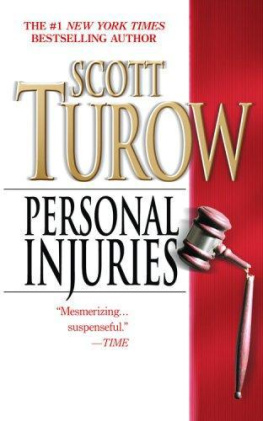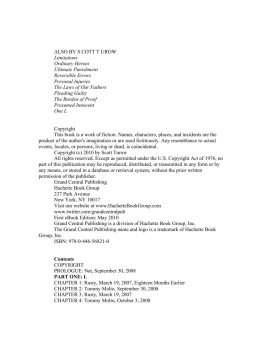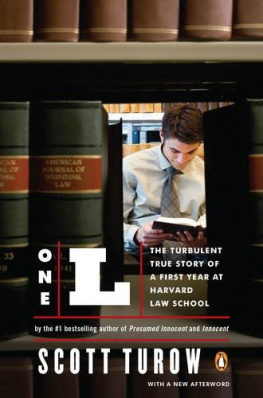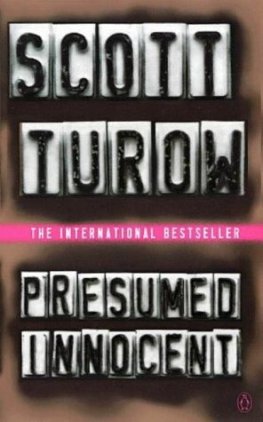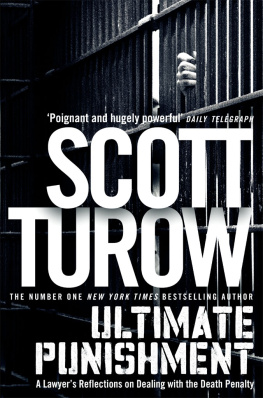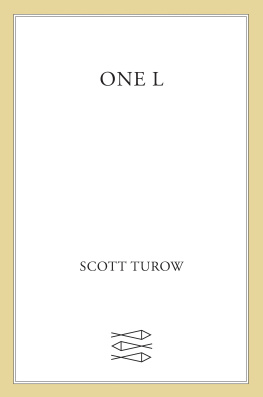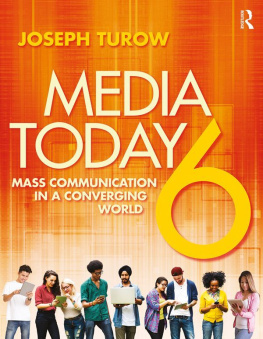Scott Turow - Personal Injuries
Here you can read online Scott Turow - Personal Injuries full text of the book (entire story) in english for free. Download pdf and epub, get meaning, cover and reviews about this ebook. year: 2000, publisher: Grand Central Publishing, genre: Detective and thriller. Description of the work, (preface) as well as reviews are available. Best literature library LitArk.com created for fans of good reading and offers a wide selection of genres:
Romance novel
Science fiction
Adventure
Detective
Science
History
Home and family
Prose
Art
Politics
Computer
Non-fiction
Religion
Business
Children
Humor
Choose a favorite category and find really read worthwhile books. Enjoy immersion in the world of imagination, feel the emotions of the characters or learn something new for yourself, make an fascinating discovery.
- Book:Personal Injuries
- Author:
- Publisher:Grand Central Publishing
- Genre:
- Year:2000
- Rating:3 / 5
- Favourites:Add to favourites
- Your mark:
- 60
- 1
- 2
- 3
- 4
- 5
Personal Injuries: summary, description and annotation
We offer to read an annotation, description, summary or preface (depends on what the author of the book "Personal Injuries" wrote himself). If you haven't found the necessary information about the book — write in the comments, we will try to find it.
Personal Injuries — read online for free the complete book (whole text) full work
Below is the text of the book, divided by pages. System saving the place of the last page read, allows you to conveniently read the book "Personal Injuries" online for free, without having to search again every time where you left off. Put a bookmark, and you can go to the page where you finished reading at any time.
Font size:
Interval:
Bookmark:

Welcome, thou kind deceiver!
Thou best of thieves; who with an easy key
Dost open life, and unperceived by us,
Even steal us from ourselves.
JOHN DRYDEN, All for Love
THE BEGINNING
CHAPTER 1
HE KNEW IT WAS WRONG, AND THAT HE was going to get caught. He said he knew this day was coming.
He knew they had been stupid, he told me-worse, greedy. He said he knew he should have stopped. But somehow, each time he thought they'd quit, he'd ask himself how once more could make it any worse. Now he knew he was in trouble.
I recognized the tune. Over twenty-some years, the folks sitting in that leather club chair in front of my desk have found only a few old standards in the jukebox. I Didn't Do It. The Other One Did It. Why Are They Picking on Me. His selection, I'm Sorry, made the easiest listening. But they all wanted to hear the same song from me: Maybe I Can Get You Out of This. I said it usually, although I knew it would often prove untrue. But it's a complicated business being somebody's only hope.
This is a lawyer's story, the kind attorneys like to hear and tell. About a case. About a client. His name was Robert Feaver. Everyone knew him as Robbie, although he was getting old for that kind of thing, forty-three, he'd said, when I asked his age. The time was 1992, the second week in September. The pundits had finally stopped predicting that Ross Perot was going to be the next President of the United States, and the terms "dot" and "coin" had not yet been introduced to one another. I recall the period precisely because the week before I had returned to Virginia to lay my father to rest. His passing, which over the years I'd assumed I would take as being in the natural order of things, had instead imbued all my waking moments with the remote quality of dreams, so that even my hand, when I considered it, seemed disconnected from my body. Robbie Feaver's troubles were more immediate. Last night, three Special Agents of the Internal Revenue Service's Criminal Intelligence Division had visited him at home-one to talk and two to listen. They were, as you would expect, rumpled men in inexpensive sport coats, grave but polite. They had handed him a grand jury subpoena for all of his law partnership's financial records and tried to ask Robbie questions about his income tax returns. Wisely, he had refused to reply. He could suit himself, responded the one agent who spoke. But they wanted to tell him a couple things. Good news and bad. Bad first.
They knew. They knew what Robbie and his law partner, Morton Dinnerstein, had been up to. They knew that for several years the two had occasionally deposited a check they received when they won or settled one of their personal injury cases in a secret account at River National Bank, where the firm transacted no other business. They knew that out of the River National account Dinnerstein and Robbie had paid the usual shares of what they'd earned-two thirds to the clients, one ninth to the referring attorneys, odd amounts to experts or court reporters. Everyone had received his due. Except the IRS. They knew that for years now, Feaver and his partner had been writing checks to cash to draw down the balance of the account, never paying a dime in tax. You guys are cold-cocked, the agent added. Robbie laughed now, very briefly, repeating the words.
I didn't ask how Robbie and his partner could have ever believed a scheme so simpleminded would work. I was long accustomed to the dumb ways people get themselves in trouble. Besides, the fact was that their scam had operated smoothly for years. A checking account that paid no interest was unlikely to come to the Service's attention. It was, frankly, noteworthy that it had, a development that would inevitably be traced to freak coincidence, or, if things were spicier, betrayal.
Feaver had heard out the agents in his living room. He was perched on a camelback sofa smartly upholstered in bleached silk, trying to contain himself. To smile. Stay slick. He opened his mouth to speak but was interrupted by the unexpected sensation of a single cold rill of his own sweat tracking the length of his side until it was absorbed in the elastic waistband of his boxers. And the good news? he asked on second effort.
They were getting to that, the agent said. The good news was that Robbie had an opportunity. Maybe there was something he could do for himself. Something that a person with his family situation ought to consider.
The agent then walked across the marble foyer and opened the front door. The United States Attorney, Stan Sennett, was standing on Robbie's doorstep. Feaver recognized him from TV, a short man, slender, kempt with a compulsive orderliness. A few gnats zagged madly under the light above the careful part in Sennett's head. He greeted Feaver with his in-court expression, humorless as a hatchet blade.
Robbie had never practiced a day of criminal law, but he knew what it meant that the United States Attorney was standing in person on his front stoop late at night. It meant the biggest gun was pointed straight at him. It meant they wanted to make him an example. It meant he'd never get away.
In his terror, Robbie Feaver found a single useful thought.
I want a lawyer, he said.
He was entitled, Sennett finally responded. But perhaps Robbie should listen to him first. As soon as Sennett set a polished brogan across the threshold, Robbie repeated himself. I can't promise the deal will be the same tomorrow, Sennett told him. Lawyer, Feaver said again.
The agents took over then, offering advice. If he was going to an attorney, find a good one, someone who'd been around. Talk to that lawyer-and no one else. Not Mom. Not the wife. And certainly not his law partner, Dinnerstein. The U.S. Attorney passed one agent his card, and the agent handed it to Feaver. Sennett would be waiting for Feaver's lawyer's call. About to step down into the darkness, the prosecutor asked over his shoulder whether Bobbie had anyone in mind. Interesting choice, Sennett told Feaver with a shallow smile when he heard my name.
"I'm not a rat," Robbie Feaver said now. "That's the play, right, George? They want me to dime somebody out."
I asked if he had any idea who.
"Well, it better not be Mort. My partner? Never. There's nothing to say about Mort." Feaver and Dinnerstein were lifelong friends, he told me, next-door neighbors as boys growing up in the Jewish enclave of Warren Park, here in DuSable, roommates through college and law school. But their secret account was joint, both men had made deposits and written the checks to cash, and neither had reported the income. There was enough damaging paper that it seemed unlikely the IRS was going to need anyone's assistance to install either one of them in the trophy case.
I asked if there might be something else the government wanted Robbie to tell them about Mort, or any other person, but Feaver hitched a shoulder limply, looking lost. I did not know Robbie Feaver well. When he'd called this morning, he'd reminded me that we'd met several times in the lobby of the LeSueur Building where we each had our law offices, and of the committee work he'd done for the Kindle County Bar Association a couple of years ago during my term as president. My memories of him were vague and not necessarily pleasant. Measured according to the remaining reflexes of a proper Southern upbringing, he was the kind of fellow who'd be described simply as 'too much.' Too good-looking in the sense that he was too well aware of it. Too much stiff, dark hair that reflected too much fussing. He was tanned in every season and spent too much money on his clothes-high-styled Italian suits and snazzy foulards accompanied by too much jewelry. He spoke too loudly, and too eagerly to strangers in the elevator. In fact, in any setting, he talked too much-one of those people who went one up on Descartes: I speak, therefore I am. But I now saw one apparent virtue: he could have told you all of that. Diminished by fear, he maintained an air of candor, at least about himself. As clients went, therefore, he seemed, on first impression, better than average.
Next pageFont size:
Interval:
Bookmark:
Similar books «Personal Injuries»
Look at similar books to Personal Injuries. We have selected literature similar in name and meaning in the hope of providing readers with more options to find new, interesting, not yet read works.
Discussion, reviews of the book Personal Injuries and just readers' own opinions. Leave your comments, write what you think about the work, its meaning or the main characters. Specify what exactly you liked and what you didn't like, and why you think so.

